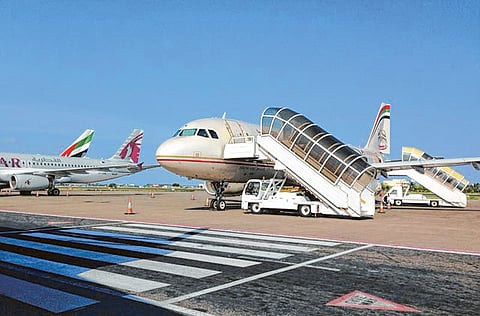Middle East airlines must consolidate to survive — IATA
IATA says consolidation is in the best interest of large and small carriers

Dubai; Middle East airlines that are not backed by government coffers must consider consolidating if they want to survive the pressures of the world’s major carriers, a top regional aviation executive has said.
Airlines continue to try and offset the challenges posed by rising fuel costs, regional political instability and increasing competition from the Gulf aviation giants, Emirates, Etihad Airways and Qatar Airways.
“Consolidation in this part of the world has not yet taken place but it should. We have too many small airlines that will find it difficult to survive with the pressure and the expansion of airlines in the region,” said Hussain Dabbas, Africa & Middle East Regional Vice-President at the International Air Transport Association (IATA).
IATA is a global trade association for airlines.
The Gulf giants have taken their own approach to global consolidation. Emirates partners with Australian carrier Qantas, Qatar Airways has joined the OneWorld alliance and Etihad is growing through minority acquisitions of foreign airlines.
But Dabbas said that the other flag carriers in the Middle East, such as Royal Jordanian, Saudia and Iraqi Airlines, are unlikely to fold under the pressure. “Countries might cut subsidies for building roads but they will keep the [national] airline alive because it is a symbol of the country,” he said.
It is the smaller, private airlines that are at threat.
SAMA Airlines, a Saudi Arabian low-cost carrier, folded back in 2010. More recently, UAE carrier RAK Airways, ceased operations last month citing financial pressure and regional political instability.
Dabbas said that consolidation is inevitable and is in the best interest of the large carriers and the small carriers because both can feed each other traffic.
Outside the Middle East, Etihad has taken a minority stake in European regional carrier Darwin Airline to set up Etihad Regional. The carrier now feeds traffic from destinations across Europe to Zurich, Switzerland, where passengers can travel onward with Etihad to Abu Dhabi and beyond.
“How they’re selecting airlines in different parts of the world to open different markets that they cannot handle on their own is extremely good for Etihad,” Dabbas said. “Other airlines should look at that as a model for expansion.”
Etihad has equity stakes in several carriers from Europe as well as from India, the Seychelles and Australia.
But some of the Gulf carriers at one point were not looking at partnerships and seemed as if they were attempting to go it alone.
“The major three Gulf carriers have realised they have reached a level of maturity and being actually the airline that sets the rules. They are big enough, large enough and rich enough to say we want to do this and that,” Dabbas said.
The three major airline alliances, OneWorld, SkyTeam and Star Alliance, attract more than 80 per cent of the global passenger traffic, according to Dabbas.
“The alliances now have a huge percentage of airlines. I mean all the big airlines are part of alliances. You can’t fight them,” he said.
Sign up for the Daily Briefing
Get the latest news and updates straight to your inbox



